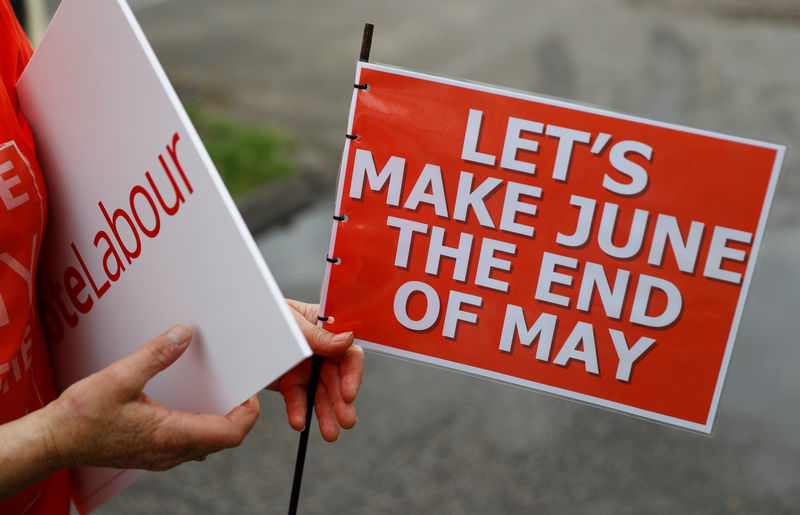By Guy Faulconbridge and Paul Sandle
LONDON (Reuters) - Prime Minister Theresa May could lose control of parliament in Britain's June 8 election, according to a projection by polling company YouGov, raising the prospect of political turmoil just as formal Brexit talks begin.
The YouGov model suggested May would lose 20 seats and her 17-seat working majority in the 650-seat British parliament, though other models show May winning a big majority of as much as 142 seats and a Kantar poll showed her lead widening.
If the YouGov model turns out to be accurate, May would be well short of the 326 seats needed to form a government tasked with the complicated talks, due to start shortly after the election, on Britain's divorce from the European Union.
A later poll, a separate regular survey carried out by YouGov for Thursday's Times newspaper, showed May's Conservative Party just three percentage points ahead of the Labour opposition, which has been eating into her lead since the start of the campaign.
The Conservatives were on 42 percent, down a point from last week, with Labour up three points, the YouGov survey said.
The findings again weakened sterling which had earlier fallen almost a cent against the U.S. dollar on the YouGov model before rising on a Kantar poll which showed May's lead had increased to 10 percentage points.
May called the snap election in a bid to strengthen her hand in Brexit negotiations, to win more time to deal with the impact of the divorce and to strengthen her grip on the Conservative Party.
But if she does not handsomely beat the 12-seat majority Cameron won in 2015, her electoral gamble will have failed and her authority could be undermined just as she tries to deliver what she has told voters will be a successful Brexit.
If May fails to win an overall majority, she would be forced to strike a deal with another party to continue governing either as a coalition or a minority government.
That would raise questions about the future of Brexit, Britain's $2.5 trillion economy and British policy on a range of issues including corporate taxation and government spending and borrowing.
LANDSLIDE TO LOSING?
When May stunned politicians and financial markets on April 18 with her call for a snap election, opinion polls suggested she could emulate Margaret Thatcher's 1983 majority of 144 seats or even threaten Tony Blair's 1997 Labour majority of 179 seats.
But polls had shown May's rating slipping over the past month and they fell sharply after she set out plans on May 18 to make some elderly people pay a greater share of their care costs, a proposal dubbed the "dementia tax" by opponents.
A total of eight polls carried out since the May 22 Manchester suicide attack have shown May's lead over the Labour Party narrowing, with some suggesting she might not win the landslide predicted just a month ago.
When asked by a reporter if she would resign if she lost seats, May dodged the question on Wednesday, saying that the only poll that mattered was the election on June 8.
Recent opinion polls have shown May's lead has contracted to a range of 5 to 14 percentage points. YouGov's election model was based on voting intention figures which gave May a lead of just 3 percentage points, YouGov said.
"Once the Conservative lead falls below 7 points we are potentially in the world of a hung parliament," said John Curtice, a leading election expert who is president of the British Polling Council.
"Support for Labour among younger voters has gone up and gone up dramatically but then the crucial question is whether these young people will come out to vote," Curtice said.
YouGov, using a technique called "Multilevel Regression and Post-stratification", uses a range of factors including demographics, past elections and voter profiles to build a model which can come up with an estimate of how the vote will be split in individual constituencies.
MODELING ELECTIONS
Michael Ashcroft, a former Conservative Party donor who funds polling, uses the same types of modeling as YouGov but came up with a very different estimate of the election: May winning 396 seats and Corbyn winning 180 seats.
Other projections suggested May would win soundly. The Electoral Calculus website, which predicts the results based on polls and electoral geography, said May would win 371 seats and Labour 205 seats.
Betting markets give a more than 80-percent probability of May winning an overall majority, though they were wrong ahead of the unexpected Brexit result in the June 23 referendum last year.
YouGov acknowledged that its predictions were controversial and allowed for a wide margin of error, adding that the samples in each constituency were small.
Jim Messina, a polling and data adviser for the Conservative Party who worked on Barack Obama's campaign, said the YouGov numbers were stupid and that he had spent the day laughing at them.

YouGov allowed for big variations in the outcome of the election, ranging from as high as 345 seats for the Conservatives, 15 more than their current number, to as low as 274, the pollster's chief executive, Stephan Shakespeare, said.